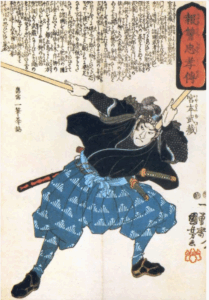🗡 Miyamoto Musashi: Sword, Strategy, and the Still Mind
 What a 17th-century samurai can teach us about decision-making, discipline, and detachment in modern life
What a 17th-century samurai can teach us about decision-making, discipline, and detachment in modern life
“Today is victory over yourself of yesterday; tomorrow is your victory over lesser men.”
— Miyamoto Musashi, The Book of Five Rings
In a world of distraction, overthinking, and emotional burnout, it’s remarkable how deeply the life of a 17th-century Japanese swordsman still resonates.
Miyamoto Musashi (1584–1645) was more than just a warrior.
He was a master strategist, philosopher, artist, and introspective recluse who challenged conventional wisdom and created his own mental path — what he called “The Way” (Dō).
Though he won over 60 duels, many against elite swordsmen, his true battle was always within — mastering fear, desire, and illusion.
🧒 Origins: Forged in Fire
Musashi was born in the village of Miyamoto in Harima Province during a time of brutal civil war in Japan. His mother died early, and he was raised by an uncle — a monk who gave him early exposure to Zen thought.
At age 13, Musashi fought and killed a grown man in a duel — Arima Kihei of the Shinto-ryu school — setting him on a path of combat and ascetic mastery.
This was no ordinary prodigy. Musashi’s entire life would become a radical act of living deliberately — rejecting privilege, polish, and even comfort.
He rarely bathed, dressed plainly, and refused to settle or marry. Yet, his reputation grew with each duel, not just because he won, but because he won differently.
⚔ The Duel at Ganryū-jima: Defeating Sasaki Kojirō
Perhaps the most iconic moment in Musashi’s life was his 1612 duel with Sasaki Kojirō, a highly respected samurai known for his “Swallow Cut” technique.
Musashi, 28 at the time, showed up late to the duel — an intentional psychological tactic to unsettle his opponent. He arrived rowing a boat, carved an oar into a wooden sword, and killed Kojirō with it in a single stroke.
But the story isn’t just about physical victory.
Musashi understood timing, rhythm, and emotional control. He had studied his opponent’s ego, temperament, and tactics — and used psychological warfare to defeat him even before the fight began.
In The Book of Five Rings, he later described the art of “Seeing that which cannot be seen” — referring not just to intuition, but to perception beyond appearances.
🎨 The Warrior as Artist
After decades of dueling and battlefield experience (including participation in the Battle of Sekigahara and the Siege of Osaka), Musashi gradually withdrew from combat and turned inward.
He became a master of:
-
Ink painting (sumi-e) – Often with stark, simple, Zen-like imagery
-
Calligraphy – Reflecting precision and inner clarity
-
Sculpture and poetry – Demonstrating the balance of art and awareness
To Musashi, strategy wasn’t just for battle. It was a path of self-refinement — one where sword, brush, and breath followed the same principles.
📖 The Book of Five Rings: Psychology in Disguise
In 1645, just weeks before his death, Musashi dictated his treatise on strategy: Go Rin No Sho — The Book of Five Rings.
He framed life through five elemental scrolls:
-
Earth (Chi) – Foundation, grounding, understanding the big picture
-
Water (Sui) – Adaptability, fluidity, flexibility of form
-
Fire (Ka) – Direct confrontation, energy, seizing initiative
-
Wind (Fū) – Observing others’ styles and avoiding their dogma
-
Void (Kū) – Emptiness, intuition, non-attachment, and mental stillness
These weren’t esoteric abstractions — they were decision frameworks for warriors, leaders, and thinkers.
Musashi’s idea of the “Void” is especially powerful. It’s not nihilism. It’s clarity beyond thought — where action flows from understanding, not analysis paralysis.
🧘♂️ Musashi’s Relevance to Modern Minds
Whether you’re an entrepreneur, a student, a therapist, or simply someone feeling stuck — Musashi’s life offers profound psychological and strategic insights:
1. Detach from Outcome, Focus on Process
Musashi never fought for fame or validation. His victories were the natural results of process, practice, and presence.
In therapy, this parallels Acceptance and Commitment Therapy (ACT) — focusing on values-based action, not external results.
2. Know the Rhythm of Things
He emphasized recognizing the “timing” in all things — battles, conversations, emotions.
In leadership, this becomes emotional intelligence; in psychiatry, it’s timing interventions and empathy wisely.
3. Be formless like water, grounded like earth
Musashi moved fluidly between roles: fighter, philosopher, artist, and teacher.
In modern life, adaptability (resilience) combined with anchored values is the true edge.
🔍 Final Lessons: The Way Is in the Practice
“You must understand that there is more than one path to the top of the mountain.”
Musashi reminds us that strength isn’t about control.
It’s about self-mastery.
In a noisy world, his quiet discipline is a sharp contrast — and a necessary one.
He died in a cave, writing about emptiness, after leaving behind no biological children — but a lineage of mental strategy that continues to influence martial arts, leadership thinking, therapy, and even corporate strategy across the world.
📍 Applied Musashi: How I Use These Lessons in Practice
As a Consultant Psychiatrist (AIIMS-trained) and MBA (BITS Pilani) graduate, I combine ancient wisdom with modern science to help people:
-
Think clearly under pressure
-
Act with confidence under uncertainty
-
Overcome emotional reactivity through structure and awareness
Whether it’s a patient overwhelmed with anxiety, a couple navigating conflict, or a professional stuck in indecision — I use tools from CBT, psychodynamic insight, and decision frameworks (like ADKAR, RATER, and probability thinking) to build mental clarity and strategic thinking.
Just like Musashi did — with his sword, and later, his brush.
🧩 Work With Me
Dr. Srinivas Rajkumar T
Consultant Psychiatrist | AIIMS New Delhi | MBA – BITS Pilani
Helping individuals sharpen their strategy, calm their minds, and live with inner clarity.
🌐 srinivasaiims.com | 📱 8595155808
📍 Velachery | Tambaram | Adyar | Online consults available